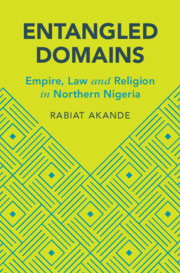Book contents
- Entangled Domains
- Cambridge Studies in Law and Society
- Entangled Domains
- Copyright page
- Dedication
- Contents
- Acknowledgments
- Note on Terms
- Introduction
- Part I Governing Faith
- Part II Constituting Difference
- Chapter Three The Construction of Minorities
- Chapter Four The Making of the 1958 Penal Code
- Chapter Five Constituting Rights
- Part III Imagining the Past
- Bibliography
- Index
- Cambridge Studies in Law and Society
Chapter Three - The Construction of Minorities
Late Imperial Secularity and the Constitutional Politics of Decolonization
from Part II - Constituting Difference
Published online by Cambridge University Press: 18 May 2023
- Entangled Domains
- Cambridge Studies in Law and Society
- Entangled Domains
- Copyright page
- Dedication
- Contents
- Acknowledgments
- Note on Terms
- Introduction
- Part I Governing Faith
- Part II Constituting Difference
- Chapter Three The Construction of Minorities
- Chapter Four The Making of the 1958 Penal Code
- Chapter Five Constituting Rights
- Part III Imagining the Past
- Bibliography
- Index
- Cambridge Studies in Law and Society
Summary
The chapter chronicles the emergence of religious minorities in late colonial constitutional politics. Efforts to actualize the missionary dream of winning souls took the form of self-determination advocacy in the late colonial years with Protestant advocates constructing the religious minorities as the group seeking self-determination. Although the religious minorities emerged to resist colonial rule, paradoxically, making that identity affirmed the Muslim-non-Muslim classification central to colonial governance. By telling a story of the oppression of Christians and diverse indigenous faiths based on their status as non-Muslims, Protestant advocates constructed an identity centered on its antithesis to Islam. That binary failed to capture the complex forms of exclusion that colonial governance of religion entailed. Although it purported to be inclusive of all non-Muslim concerns, self-determination advocacy overwhelmingly privileged the Protestant experience. Moreover, the religious minorities' identity excluded Muslim populations marginalized in the colonial state. The ultimate consequence was that the religious minorities project opened new doors to inequality.
Keywords
- Type
- Chapter
- Information
- Entangled DomainsEmpire, Law and Religion in Northern Nigeria, pp. 107 - 143Publisher: Cambridge University PressPrint publication year: 2023



